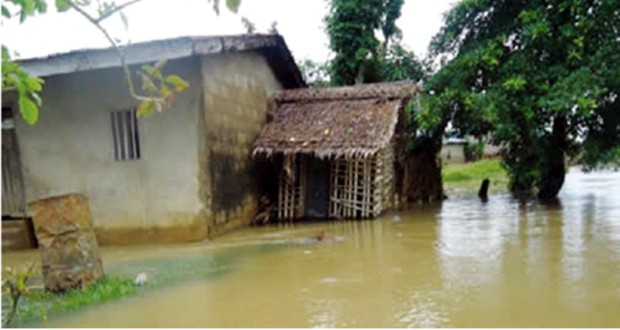Rampaging flood has wiped out at least six persons, including the son of an Air Force officer and a University of Calabar, UNICAL official, and also submerged over 30 houses in Calabar, capital of Cross River State, in the last few weeks, sparking fear and panic among residents.
A University of Calabar, UNICAL staff, was also brushed off by flood, weeks earlier.
Director General of the Cross River State Emergency Management Agency, SEMA, Mr John Inaku, who corroborated the report advised those living in flood prone areas to relocate to upland areas to avoid being brushed away by flood.
He called on the Federal Government to extend assistance given to other states to Cross River “to enable us cope with the demands and tide of requests by those affected by flood with their houses and belongings swept away.”
The UNICAL official we gathered unfortunately stepped out of his car, along IBB Way, while it was raining to find out what was causing obstruction to the cars ahead of him when the rampaging flood swept him off. His body was yet to be seen by his family members, who spent days searching for him.
Another victim narrated her ordeal to this publication, “I was coming back from church yesterday evening and suddenly there was a heavy down pour and I took shelter in one shop along MCC and when the rain subsided, I decided to go home and lo and behold, the entire MCC by Efio Ette Round about was over flooded. As I made to move in the water, I was swept away, but for some young men who were coming behind me that rescued me, I would have been gone now,” Augusta, a student of UNICAL said.
Recently, a couple returning from work was caught in an early evening rain, when they got to Target, by Murray Street, flood run off with their car.
Penultimate week, the premises of the Nigerian Chronicle were over flooded, its perimeter fence pulled down, printing machines and other office equipment were devastated.
The coastal location of the city, which is surrounded by rivers, makes it prone to flooding, particularly during the rainy season stretching from late April to November even as the city most often witnesses rainfall all year round.
To address the problem, military administrator of the state in the 90s, Ernest Kizito Attah, constructed a major drainage system that cuts through the heart of the city beginning from Navy Barracks, along IBB way down to Ekpo Abasi and terminates close to the sea.
The drainage was able solve the perennial flooding of the city for some time, but construction of buildings along water paths compounded the problem and the flooding worsened.
Senator Liyel Imoke, immediate past governor of the state, constructed another underground water channel spanning two kilometres. The underground water drainage takes water from places like Ikot Ishie, MCC Road, Parliamentary Village, Ikotenin and empties at the western flank of the Calabar River.
The effort temporarily stopped the flooding at Bishop’s Court on Bishop Monagh Avenue, MCC Road, St Patrick’s College and other places along that stretch, but it was short lived as blocking of drains by residents of the city ensures the flooding persists.
This unwholesome attitude by residents and the inability of the authorities to checkmate it and also remove the debris deposited in the drains have ensured that flooding got worse.
Manager, Nigerian Meteorological Agency, NiMeT, located at the Margaret Ekpo International Airport, Mr Eno Ikwen, said about 2800 millimeters of rainfall is expected in the state in 2018 and that most of the rainfall will take place in the months of July and September and Calabar with its proximity to the sea would have the likelihood of experiencing extensive flooding during the period

